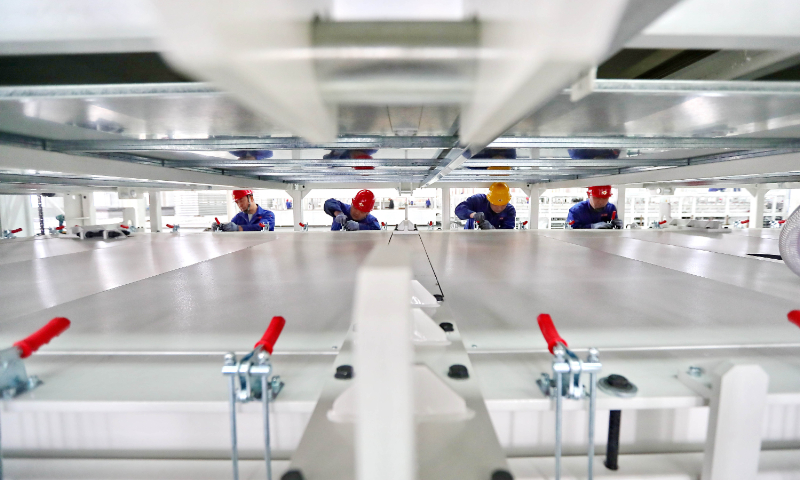
Workers make solar panel laminating machines at a factory in Qinhuangdao, North China's Hebei Province, on April 10, 2024. A manufacturing center for photovoltaic smart equipment went into operation in January, with an annual capacity of 800 solar panel laminators, which are used to produce solar battery modules. Photo: VCG
China's main business group in the EU has excoriated Brussels for weaponizing its own regulations to engage in economic coercion of Chinese businesses, and the group urged the EU to treat Chinese firms fairly, after the EU launched investigations into Chinese firms in the clean-energy sector.
The EU's moves targeting various Chinese businesses in areas such as wind turbines, solar panels and medical devices, based on accusations that the companies had received subsidies, are in effect protectionist moves that aim to protect EU businesses while cracking down on Chinese firms that have a clear competitive edge.
Such moves not only pose serious risks for bilateral economic and trade cooperation, but also will turn out to be counterproductive, Chinese experts said on Tuesday.
In its latest move, the EU had published two summary notices pertaining to the second and third in-depth investigations under the Foreign Subsidies Regulation (FSR), which involved Chinese businesses, according to the China Chamber of Commerce to the EU (CCCEU).
"The chamber restates its firm opposition to the European Commission's use of the FSR as a means to economically pressure Chinese companies operating in the EU, particularly in the green transition sector, with this new tool," the CCCEU said in a statement it sent to the Global Times on Tuesday.
Implemented in January 2023, the FSR has been frequently used by the EU to target Chinese businesses. On April 3, the EU launched two in-depth investigations under the FSR into the "potentially market distortive role of foreign subsidies given to bidders in a public procurement procedure."
Specifically, the probe involved a consortium composed of Romania's ENEVO and a unit of China's LONGi, and subsidiaries of Chinese state-owned Shanghai Electric Group. The consortium offered a public tender for a solar power project in Romania.
In its long statement, the CCCEU raised serious concerns about various aspects of the FSR, including its overly broad and non-exhaustive definition of "foreign financial contributions" and a significant lack of transparency.
"The FSR has been weaponized by the EU side and functions as a form of economic coercion," the Chinese business group said. It urged all stakeholders to promptly reassess the implementation of the FSR and its adverse effects on the EU's investment and public procurement sectors. It called on the EU to provide Chinese firms with a fair, just and non-discriminatory environment.
The EU's move to target Chinese industries that have gained a competitive edge based on allegations that they received subsidies is baseless, Li Dawei, senior research fellow at the Institute for International Economic Research of the Chinese Academy of Macroeconomic Research, told the Global Times on Tuesday.
"Such a view obviously cannot pass the academic test and is inconsistent with the basic logic of economics. The purpose behind it is a new form of trade protectionism. Its purpose is to protect the development of related industries in the EU," Li said.. "Experience shows that the results of protectionist policies are often counterproductive."
In addition to the probes into the solar project in Romania, the EU had launched investigations under the FSR into Chinese medical devices, wind turbines and electric vehicles.
Chinese officials have repeatedly slammed the EU's investigations into Chinese businesses and products. On April 10, an official from the Ministry of Commerce made solemn representations with the EU side over the latter's investigation into Chinese wind turbines and accusations of market distortion against China.
The EU's growing protectionism against Chinese businesses and products has also posed serious risks for bilateral cooperation, with businesses from both sides warning of potentially huge damage. Last week, Jens Eskelund, president of the European Chamber in China, warned that a rising tide of protectionism threatens to become a full trade war, according to Reuters.
Chinese experts said that while the potential for greater economic and trade cooperation between China and the EU remains massive, the key is whether Brussels can adopt an objective and fair approach toward China.
"If the EU can correctly understand the win-win nature of China-EU trade, especially the contribution of emerging Chinese industries to global economic growth, the welfare of global consumers and improved productivity, the future development of China-EU trade will be bright," Li said.
Highlighting the complementary nature of China-EU trade, EU Agriculture Commissioner Janusz Wojciechowski, during a visit to China this week, will be focusing on increasing the EU's agri-food exports to China, despite rising trade tensions, Reuters reported on Monday.




